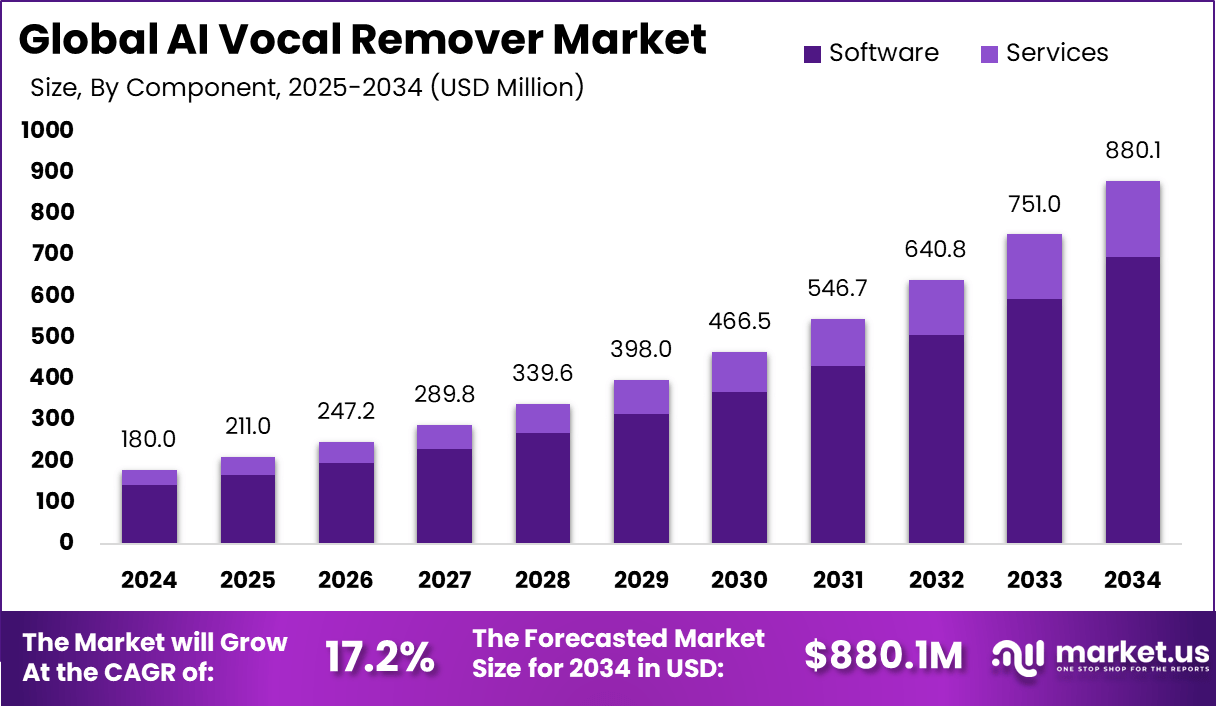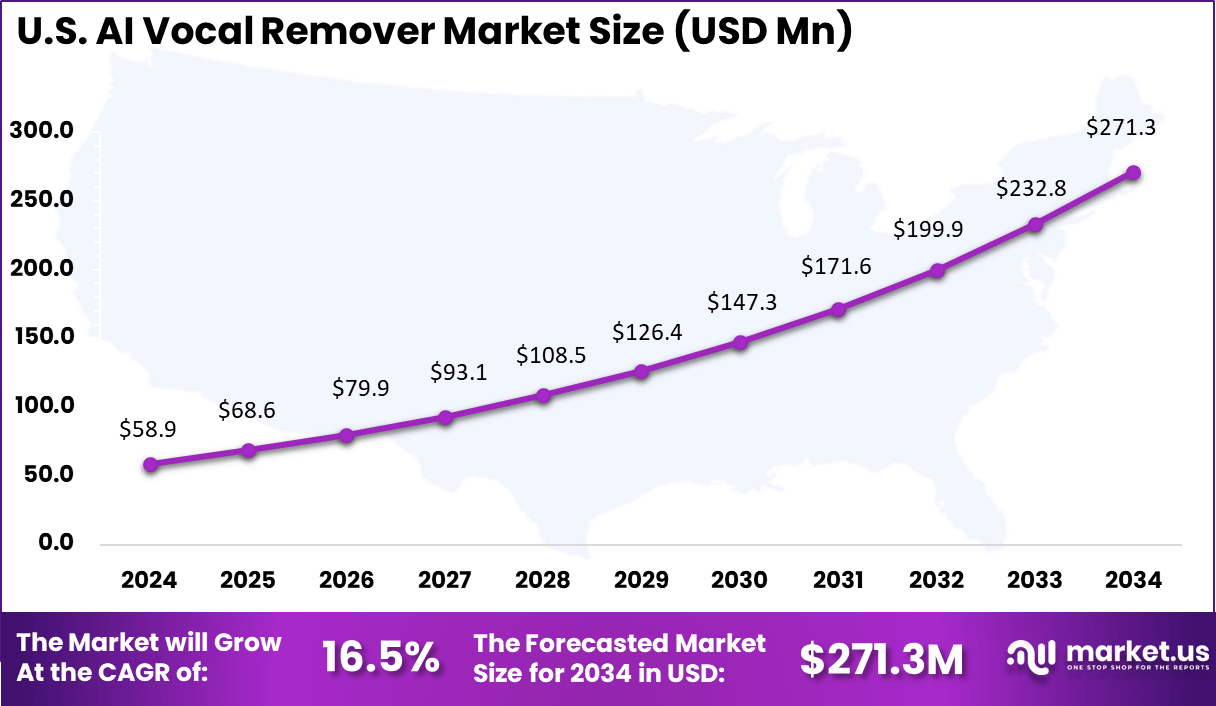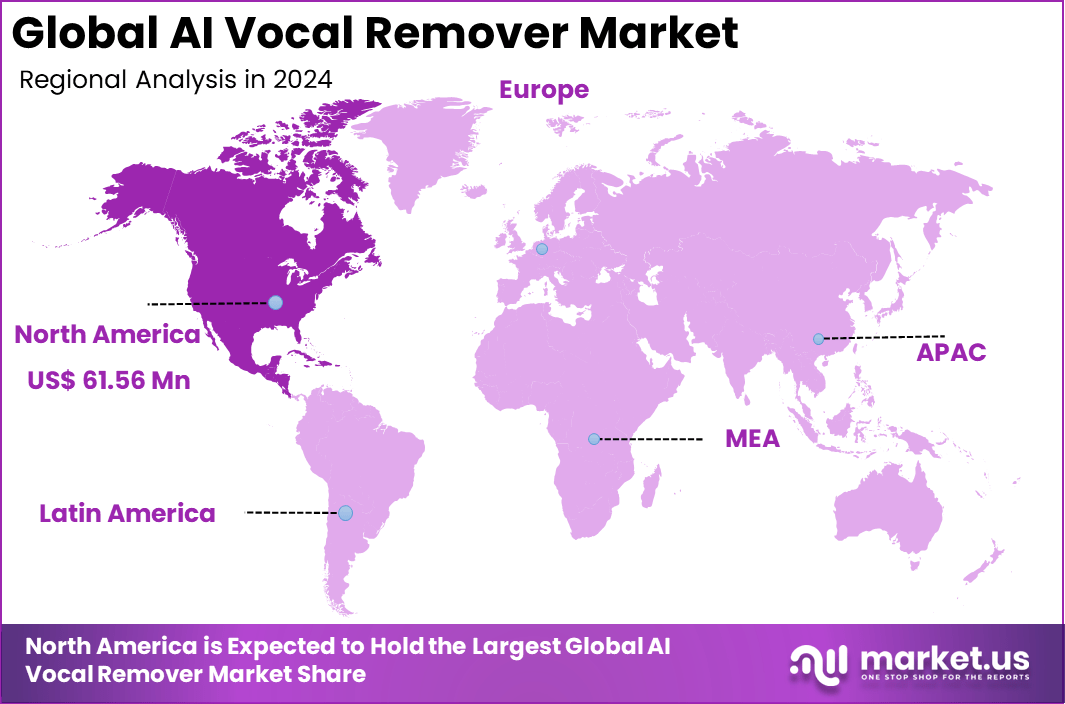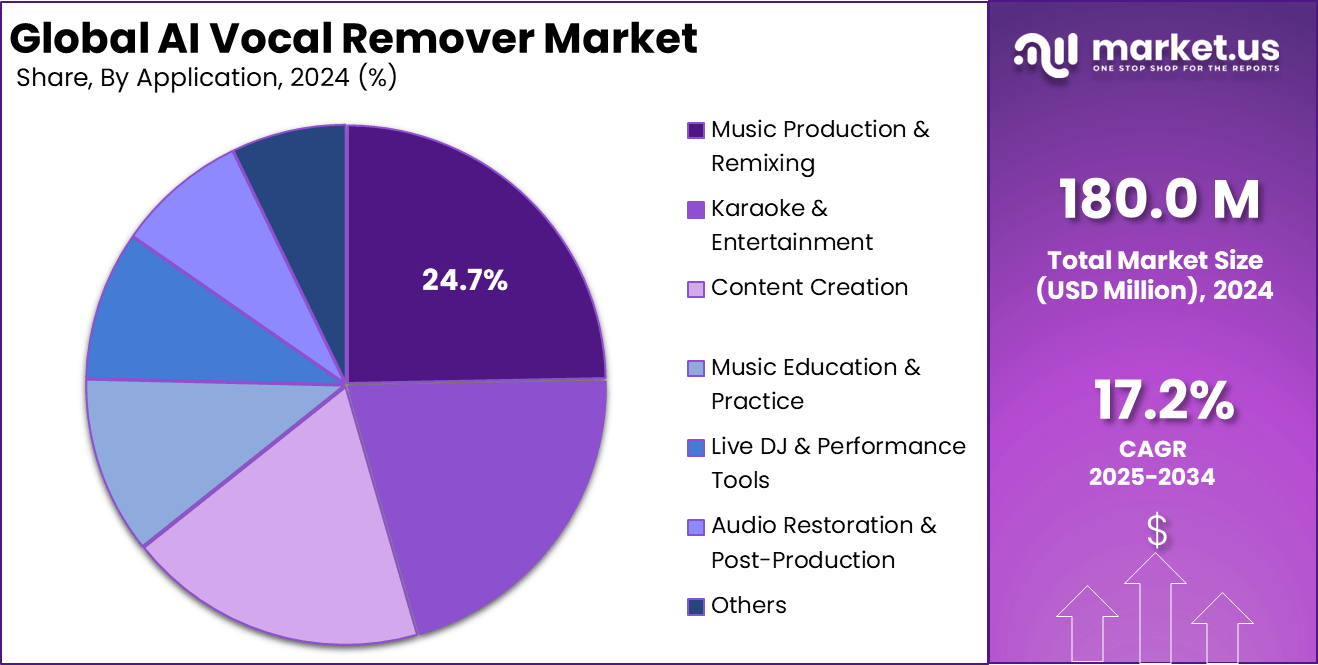Global AI Vocal Remover Market Size, Share Analysis By Component (Software and Services), by Deployment Mode (Cloud-Based and On-Premise), By Application (Music Production & Remixing, Karaoke & Entertainment, Content Creation, Music Education & Practice, Live DJ & Performance Tools, Audio Restoration & Post-Production, and Others), By End-User (Independent Musicians & DJs, Content Creators & Streamers, Music Production Studios, Karaoke Companies & Venues, Educational Institutions (Music Schools), Media & Entertainment Companies), By Region and Companies - Industry Segment Outlook, Market Assessment, Competition Scenario, Trends and Forecast 2025-2034
- Published date: August 2025
- Report ID: 154968
- Number of Pages: 199
- Format:
-
keyboard_arrow_up
Quick Navigation
- Report Overview
- Key Takeaways
- U.S. AI Vocal Remover Market
- By Component
- By Deployment Mode
- By Application
- By End-User
- Top 5 Growth Factors
- Top 5 Trends and Innovations
- Key Market Segments
- Key Regions and Countries Covered in this Report
- Driving Factor
- Restraining Factor
- Growth Opportunity
- Key Player Analysis
- Recent Developments
- Report Scope
Report Overview
The Global AI Vocal Remover Market size is expected to be worth around USD 880.1 million by 2034, from USD 180.0 million in 2024, growing at a CAGR of 17.2% during the forecast period from 2025 to 2034. In 2024, North America held a dominant market position, capturing more than a 34.2% share, holding USD 61.56 million in revenue.
The AI Vocal Remover market is rapidly shaping modern music production and digital content creation. Using advanced artificial intelligence, vocal remover tools can isolate vocals from an audio track, giving users the ability to generate instrumentals for karaoke, remixes, and multimedia projects. These platforms analyze complex audio frequencies and employ deep learning models to distinguish vocal sounds from instruments, offering results that used to require hours of manual editing.

Top driving factors fueling adoption in this market center around accessibility and efficiency. AI vocal removers deliver results within minutes, streamlining workflows for creators and professionals alike. They remove the need for costly studio sessions or expert engineering, which means even hobbyists on a budget can experiment with new audio arrangements.
The rise of music tech and social media is driving demand for fast, high-quality instrumentals for covers, remixes, and karaoke. Demand has grown considerably, penetrating multiple sectors beyond just music. Karaoke enthusiasts, budding singers, audio engineers, and social media influencers all see tangible benefits in extracting vocals from tracks for their unique uses.
This transformation is further catalyzed by the increased consumption of digital content, with audio customization remaining at the forefront of user expectations. The ease of use and instant feedback provided by AI vocal removers have made them essential tools in both home studios and professional setups.
Market Size and Growth
Metric Statistic / Value Market Value (2024) USD 180 Mn Forecast Revenue (2034) USD 880.1 Mn CAGR(2025-2034) 17.2% Leading Segment Software: 79.2% Leading Region Share North America: 34.2% Market Share Key Takeaways
- The AI vocal remover market is valued at USD 180 million in 2024 and is projected to grow at a CAGR of 17.2% from 2025 to 2034, driven by rising demand for audio isolation tools across the music and content creation industries.
- By Component, the software segment dominates with a 79.2% market share, indicating strong user preference for vocal remover applications over service-based models.
- By Deployment mode segment, Cloud-based deployment holds the largest share at 66.1%, driven by accessibility, real-time processing, and integration ease with online tools.
- By Application, the Music Production & Remixing segment leads with a 24.7% market share, highlighting the tool’s growing use among producers and remix artists for audio editing and innovation.
- By End-User segment, the Independent Musicians & DJs user group comprises the largest share at 28.9%, showcasing strong adoption among creatives seeking cost-effective, AI-driven music solutions.
- North America region holds the largest market share at 34.2%, with the U.S. accounting for USD 58.9 million, fueled by a mature music tech ecosystem and tech-savvy user base.
U.S. AI Vocal Remover Market
The U.S. AI Vocal Remover Market was valued at USD 58.9 Million in 2024 and is anticipated to reach approximately USD 271.3 Million by 2034, expanding at a compound annual growth rate (CAGR) of 16.5% during the forecast period from 2025 to 2034.
In 2024, the United States held a leading position in the AI Vocal Remover Market, driven by the region’s advanced music technology infrastructure and strong presence of digital content creators. The country benefits from a mature ecosystem of AI research institutions, cloud computing services, and software innovators that accelerate the development and deployment of vocal separation tools.
The widespread adoption of platforms like Moises.ai, LALAL.AI, PhonicMind, and Vocal Remover Pro reflects the growing need for accessible, AI-powered audio editing tools. These tools are increasingly used by U.S. based TikTok creators, YouTubers, and DJs to extract instrumental tracks for remixes, karaoke, or background music.

North America accounted for 34.2% market share of the global AI vocal remover in 2024, with the U.S. contributing to around USD 58.9 million in 2024, due to its high concentration of creators and advanced digital infrastructure.
Use cases include podcasters removing unwanted vocal noise, music producers creating clean stems for licensing, and media companies using AI to generate instrumental versions for advertising, film, and TV. The availability of mobile apps, seamless cloud integration, and support for real-time processing have further fueled adoption across the U.S.

By Component
In 2024, Software solutions make up 79.2% of the AI vocal remover market, highlighting a strong preference for digital tools that can isolate vocals from music tracks with precision. These software platforms rely on artificial intelligence and machine learning to analyze audio waveforms and separate vocals from instrumentals with a high level of accuracy.
Users benefit from intuitive interfaces, rapid processing, and compatibility with various audio formats, which makes these solutions accessible to both professionals and casual creators. The value of software-based vocal removers lies in their flexibility and ease of use.
Whether for creating karaoke tracks, remixing songs, or producing acapella versions, these tools allow musicians, DJs, and even educators to manipulate audio in ways that would traditionally require advanced technical skills or studio equipment. Regular updates and improvements in machine learning models keep software vocal removers at the forefront of the market.
By Deployment Mode
In 2024, Cloud-based platforms account for 66.1% of the market, driven by the need for remote accessibility and seamless integration. Users can upload audio files to web-based services and instantly receive separated vocal and instrumental tracks, without any need for local hardware installations.
The cloud-based approach makes vocal removal technology available across devices and operating systems, from desktops to smartphones, supporting on-the-go music editing for creators around the world. Cloud deployment further delivers scalability and cost-effectiveness for businesses and solo users alike.
With real-time processing and secure data storage, users enjoy efficient workflows, automatic updates, and the ability to access their projects from anywhere. Cloud-based vocal removers also support collaborative work, enabling multiple contributors to edit and share tracks effortlessly.
By Application
In 2024, Music production and remixing represent 24.7% of the market for AI vocal removers. Producers and DJs use these tools to isolate stems for sampling, remix arrangements, and mashups. By removing vocals cleanly, artists can experiment with instrumental backdrops, create new versions of popular songs, and add custom effects to their music.
In addition to professional studios, hobbyists and independent creators have adopted AI vocal removers to enhance their content. The technology empowers users to produce unique music tracks, organize live performances, and even restore vintage recordings by separating overlapping elements. The flexibility offered by AI vocal removers has made them a core asset in the creative process for musicians and remix artists.

By End-User
In 2024, Independent musicians and DJs comprise 28.9% of the end-user segment. This group values the ability to prepare samples, create karaoke backgrounds, and remix tracks quickly using AI vocal remover software. For independent artists, vocal removers are essential tools that reduce production time and cost while expanding creative possibilities.
The rise of digital platforms and affordable audio technology has helped independent creators compete with mainstream music producers. By leveraging AI-powered vocal removers, these users gain greater control over their work, customize tracks for performances, and respond to audience demand for remix and instrumental content.
Top 5 Growth Factors
Growth Factor Description Surge in Digital Content Creation More amateur/professional users want fast, high-quality audio editing for music, video, and podcasts Advancements in AI/ML Algorithms Rapid breakthroughs in deep learning enable more accurate and artifact-free vocal/instrument isolation Accessibility & Cost Effectiveness Online/cloud-based tools make advanced editing affordable and usable for non-experts Expansion of Karaoke/Remix Culture User-generated music, karaoke, and remixes fuel need for vocal separation tools Integration with Production Platforms AI vocal removers embedded across DAWs, video editors, and mobile apps drive further adoption Top 5 Trends and Innovations
Trend/Innovation Description Real-Time Processing Growing demand for—and delivery of—instant vocal isolation for live and streaming uses Multi-Track and Stem Separation Beyond vocals, tools now split drums, bass, piano, etc. for advanced remixes/production Cloud-Based and Browser Apps Shift from local software to web platforms enables easy, hardware-independent access Improved Accuracy/Quality Constant algorithm upgrades deliver clearer stems with fewer artifacts and higher audio fidelity Regulatory & Copyright Consideration Compliance and copyright-aware tech become key, due to rising concerns over IP and content use Key Market Segments
Component
- Software
- Cloud-Based Vocal Removers
- On-Premise/Offline Vocal Remover Software
- Services
- Custom Audio Processing Services
- Technical Support & Maintenance
- API Integration Services
Deployment Mode
- Cloud-Based
- On-Premise
Application
- Music Production & Remixing
- Karaoke & Entertainment
- Content Creation
- Music Education & Practice
- Live DJ & Performance Tools
- Audio Restoration & Post-Production
- Others
End-User
- Independent Musicians & DJs
- Content Creators & Streamers
- Music Production Studios
- Karaoke Companies & Venues
- Educational Institutions (Music Schools)
- Media & Entertainment Companies
Key Regions and Countries Covered in this Report
- North America
- The US
- Canada
- Europe
- Germany
- France
- The UK
- Spain
- Italy
- Russia
- Netherland
- Rest of Europe
- APAC
- China
- Japan
- South Korea
- India
- Australia & New Zealand
- ASEAN
- Rest of APAC
- Latin America
- Brazil
- Mexico
- Rest of Latin America
- Middle East & Africa
- GCC Countries
- South Africa
- Rest of MEA
Driving Factor
Proliferation of Online Content Creators
The explosive growth of online content creators has become a significant driver for the AI vocal remover market. Platforms like YouTube, TikTok, Instagram, and Twitch have enabled millions of individuals to produce music, podcasts, reaction videos, and karaoke content from home. Over 50 million people globally identified as content creators in 2024, with the number steadily rising due to increased access to digital tools.
These creators frequently require background music without vocals for vlogs, educational videos, tutorials, or live streams. AI vocal removers offer an efficient and cost-effective solution by separating vocals from instrumental tracks without needing professional audio engineers. For instance, streamers on Twitch use vocal removers to repurpose copyrighted tracks into background music, avoiding DMCA strikes.
Similarly, karaoke content creators leverage tools like Moises.ai and LALAL.AI to generate clean instrumental versions for sing-along videos. As demand for user-generated content surges, so does the reliance on easy-to-use, cloud-based audio processing tools, making this segment a key growth engine for the AI vocal remover market.
Restraining Factor
Audio Quality Limitation
Despite the advancements in AI-powered vocal removers, audio quality limitations remain a key restraint in their widespread professional adoption. These tools, particularly those relying on deep learning or spectral subtraction, often produce artifacts, loss of harmonics, or residual vocal traces, especially when dealing with complex mixes or low-quality input files.
For example, while tools like Spleeter or PhonicMind can separate vocals from instrumentals, the resulting tracks may still have bleeding sounds or distorted frequencies, which make them unsuitable for commercial release or studio use. A MusicTech review noted that even leading platforms sometimes struggle to isolate vocals cleanly in songs with layered instrumentation or effects like reverb and delay.
Moreover, accuracy rates of 70–85% in separation still leave room for improvement. This limitation discourages adoption by high-end studios, broadcasters, and audiophiles who demand pristine sound fidelity. As a result, while vocal remover tools are effective for casual or semi-professional users, the need for cleaner, studio-grade outputs continues to limit their reach in top-tier music production environments.
Growth Opportunity
Proliferation of Online Content Creators
Localization and multilingual capabilities present a significant growth opportunity in the AI vocal remover market, particularly as global content consumption diversifies. As vocal remover tools gain popularity in non-English speaking regions like Latin America, Asia, and the Middle East, there’s a rising need for platforms that support local languages, cultural music styles, and region-specific UI/UX.
Many existing tools primarily train their models on English-language tracks, resulting in reduced accuracy when applied to regional genres like K-pop, Indian classical, Arabic pop, or Latin reggaeton. By incorporating multilingual training datasets and regionally tailored features, companies can unlock vast untapped user bases.
Similarly, integrating language-specific lyric separation or metadata tagging can help educational institutions and music students in non-English markets. With nearly 75% of internet users accessing content in local languages, building inclusive, multilingual platforms will be key to scaling globally and gaining a competitive edge.
Key Player Analysis
In the AI Vocal Remover Market, Moises.ai, Vocal Remover Org, and PhonicMind have gained significant recognition. These platforms are widely used by musicians, podcasters, and content creators for extracting vocals and instrumentals. Splitter and Fadr have expanded their appeal by offering easy-to-use interfaces and support for real-time stem separation.
X-Minus Pro and Ultimate Vocal Remover (UVR) are popular in professional circles for offering deeper customization and open-source options. Their presence reflects growing demand for accessible, high-precision vocal isolation tools across creative segments. Music.ai, AudioStrip, and Notta.ai are positioning themselves through AI-powered innovation. These tools allow faster separation of vocals while preserving audio quality.
OmniSale GMBH, through its AI solutions, and Voice AI, have expanded capabilities in multilingual processing and real-time vocal adjustments. MVSEP and AudioCleaner also support advanced AI filters that enhance music editing for both casual and professional users. Together, these players are shaping the ecosystem by focusing on audio quality, processing speed, and cloud-based integration.
In addition, tools like AutoTune by Antares, EaseUS Vocal Remover, and Singify offer AI-assisted tuning and pitch correction features. Wondershare, FlexClip by PearlMountain, and RecCloud AI support voice editing as part of broader media creation suites. Adobe Audition remains relevant for professionals who combine AI vocal removal with layered audio editing.
Top Key Players in the AI Vocal Remover Market
- AI (OmniSale GMBH)
- Voice AI
- Vocal Remover Org
- Music.ai
- PhonicMind
- Splitter
- Moises.ai
- Fadr
- X-Minus Pro
- Ultimate Vocal Remover (UVR)
- AudioStrip
- Notta.ai
- AutoTune by Antares
- MVSEP
- AudioCleaner
- EaseUS Vocal Remover
- Wondershare
- FlexClip by PearlMountain
- Singify
- RecCloud AI
- Adobe Audition
- Other Key Players
Recent Developments
- February 2025: Perseus AI expands its capabilities to include instrument stem separation, specifically Acoustic Guitar, Electric Guitar, and Piano, allowing finer control over multi‑stem extraction workflows.
- September-October 2024: Launch of Lead & Back Vocal Splitter, enabling precise separation of lead and backing vocals, opening new creative possibilities for remixing, vocal training, and karaoke content.
- September 2024: Rollout of Perseus AI, one of the first transformer-based neural networks for vocal separation. It delivers roughly 15% better vocal extraction quality than previous models and is enabled by default across LALAL.AI’s stem-processing tools.
- August 2024: Release of Echo & Reverb Remover, aimed at improving audio clarity by eliminating unwanted acoustic artifacts, especially useful for podcast and vocal recordings.
- April 2024: Launch of LALAL.AI Voice Changer, a new feature allowing users to apply AI-generated voice transformations to sound like artists such as Drake or Taylor Swift. This functionality supports multiple languages and formats, enhancing creative flexibility.
- February 2024: Partnership between Bravelab and LALAL.AI, marking wider technical integration support and enhancing adoption among music professionals who can now integrate LALAL.AI capabilities into custom workflows.
Report Scope
Report Features Description Base Year for Estimation 2024 Historic Period 2020-2023 Forecast Period 2025-2034 Report Coverage Revenue forecast, AI impact on Market trends, Share Insights, Company ranking, competitive landscape, Recent Developments, Market Dynamics and Emerging Trends Segments Covered By Component (Software and Services), by Deployment Mode (Cloud-Based and On-Premise), By Application (Music Production & Remixing, Karaoke & Entertainment, Content Creation, Music Education & Practice, Live DJ & Performance Tools, Audio Restoration & Post-Production, and Others), By End-User (Independent Musicians & DJs, Content Creators & Streamers, Music Production Studios, Karaoke Companies & Venues, Educational Institutions (Music Schools), and Media & Entertainment Companies) Regional Analysis North America – US, Canada; Europe – Germany, France, The UK, Spain, Italy, Russia, Netherlands, Rest of Europe; Asia Pacific – China, Japan, South Korea, India, New Zealand, Singapore, Thailand, Vietnam, Rest of Latin America; Latin America – Brazil, Mexico, Rest of Latin America; Middle East & Africa – South Africa, Saudi Arabia, UAE, Rest of MEA Competitive Landscape LALAL.AI (OmniSale GMBH), Voice AI, Vocal Remover Org, Music.AI, PhonicMind, Splitter, Moises.ai, Fadr, X-Minus Pro, Ultimate Vocal Remover (UVR), AudioStrip, Notta.ai, AutoTune by Antares, MVSEP, AudioCleaner, EaseUS Vocal Remover, Wondershare, FlexClip by PearlMountain, Singify, RecCloud AI, Adobe Audition, and Others Customization Scope Customization for segments, region/country-level will be provided. Moreover, additional customization can be done based on the requirements. Purchase Options We have three license to opt for: Single User License, Multi-User License (Up to 5 Users), Corporate Use License (Unlimited User and Printable PDF) 
-
-
- AI (OmniSale GMBH)
- Voice AI
- Vocal Remover Org
- Music.ai
- PhonicMind
- Splitter
- Moises.ai
- Fadr
- X-Minus Pro
- Ultimate Vocal Remover (UVR)
- AudioStrip
- Notta.ai
- AutoTune by Antares
- MVSEP
- AudioCleaner
- EaseUS Vocal Remover
- Wondershare
- FlexClip by PearlMountain
- Singify
- RecCloud AI
- Adobe Audition
- Other Key Players













